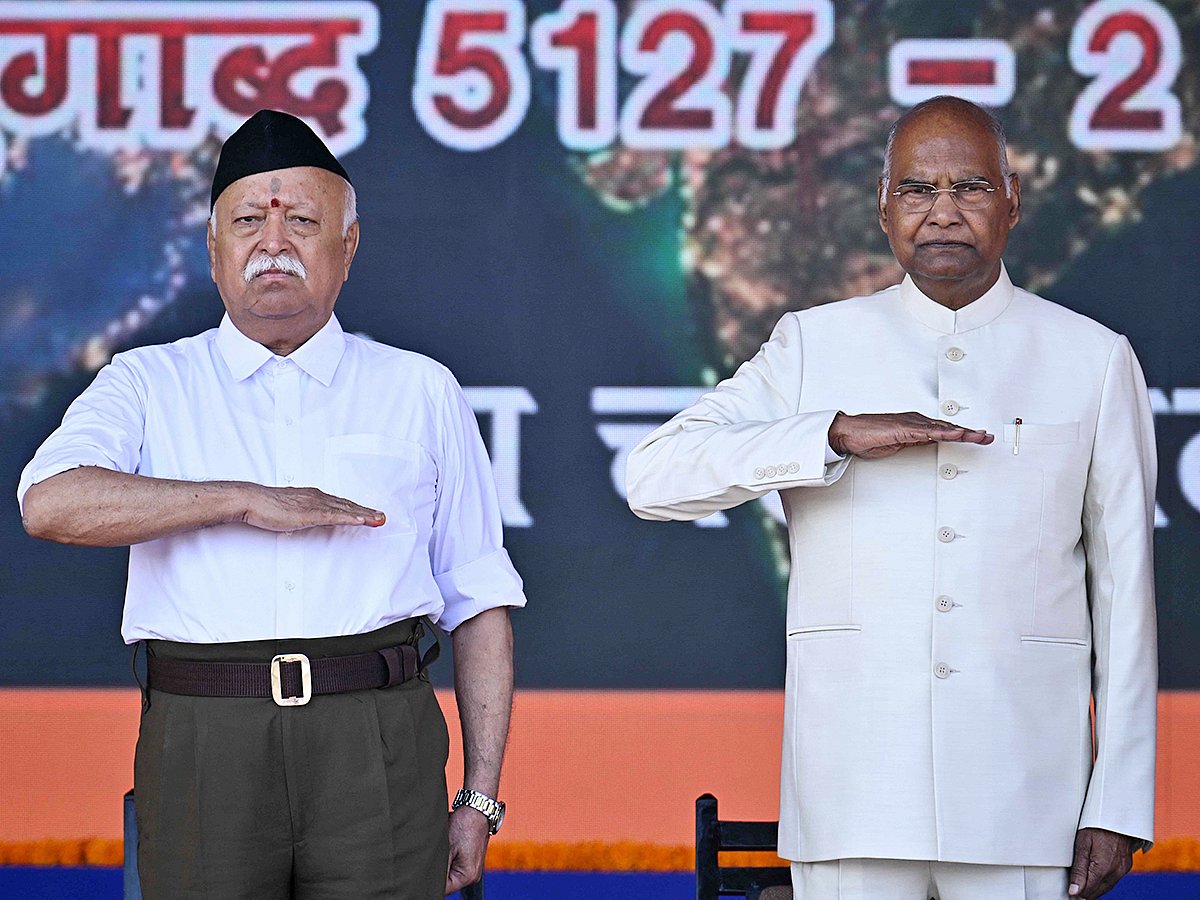RSS chief Mohan Bhagwat warns of regional turmoil, urges democratic change
Says stability in neighbouring countries vital for India’s security and cultural ties

Rashtriya Swayamsevak Sangh (RSS) chief Mohan Bhagwat on Thursday voiced concern over political upheavals in India’s neighbourhood, citing regime changes in Sri Lanka, Bangladesh and Nepal triggered by public anger. Delivering his annual Vijayadashami address in Nagpur, Bhagwat cautioned that similar forces were active in India and stressed the need for democratic methods to bring about transformation.
Warning over neighbouring countries
“In recent years, there has been considerable turmoil in our neighbouring countries. The regime change in Sri Lanka, Bangladesh and more recently Nepal due to violent outbursts of public anger is a concern for us,” Bhagwat said.
He warned that such unrest could be exploited by global powers and argued that only democratic methods can deliver meaningful change. “Violent outbursts do not have the power to bring about the desirable change. Otherwise, in such circumstances, dominant powers of the world try to find opportunities to play their own games,” he said.
Bhagwat added that stability and prosperity in neighbouring countries was essential for India, given their deep cultural and historical ties.
Call for action beyond security in Naxal-affected areas
The RSS chief also spoke on internal security challenges, particularly the Naxal movement. He praised the government’s efforts in containing extremism but urged long-term solutions.
“The extremist Naxalist movement has been largely brought under control due to firm actions of the government and the realisation among people about the hollowness of their ideology and cruelty. Now that these obstacles have been removed, a comprehensive action plan is required to ensure justice, development, goodwill, empathy and harmony in these regions,” he said.
Global challenges and human adaptation
Bhagwat reflected on broader issues affecting humanity, pointing to rapid technological progress, environmental crises and weakening social structures.
“Across the globe, scientific progress and interconnectedness present a positive picture. However, there is a considerable difference between the pace of technological progress and the pace at which humans adapt to these. Due to this, ordinary people may end up facing numerous problems,” he said.
He listed global wars, environmental damage, weakening family ties, and rising hostility as symptoms of the gap between material progress and social adaptation. Bhagwat warned that hostile forces seeking to destroy cultural and traditional bonds were aggravating these issues.
“The world is eagerly awaiting solutions that are based on Bharatiya philosophy,” he said, suggesting that India could provide a balanced approach to global challenges.
Climate change a ‘warning bell’ for South Asia
On environmental concerns, Bhagwat highlighted the destructive effects of a consumer-driven development model. He cited irregular rainfall, glacier loss and landslides as signs of worsening climate change, particularly in the Himalayas.
“The harmful consequences of the materialist and consumerist development model are increasingly becoming evident everywhere. The occurrence of these disasters in the Himalayas should be considered as a warning bell for Bharat and other countries of South Asia,” he cautioned.
Vijayadashami celebrations and RSS centenary
The RSS marked the festival of Vijaya Dashami with a large gathering at its headquarters in Nagpur. The event also doubled as the centenary celebration of the RSS, founded in 1925.
The programme included the traditional Sangh Prarthana and a ceremonial parade. Union Minister Nitin Gadkari, Maharashtra Chief Minister Devendra Fadnavis, and other senior leaders attended. Former President Ram Nath Kovind was the chief guest, alongside several Indian and international dignitaries.
The centenary event underlined the RSS’s growing influence in national life and provided a platform for Bhagwat to outline his concerns on regional stability, internal challenges and the global future.
Key message
Bhagwat’s address struck a balance between caution and optimism. He warned of internal and external forces of instability, urged democratic engagement, and pressed for development that is sustainable and rooted in cultural values. His call to treat climate and social crises as urgent warning signs echoed his central message: transformation is possible only through collective responsibility, justice, and harmony.
— With inputs from ANI
Network Links
GN StoreDownload our app
© Al Nisr Publishing LLC 2026. All rights reserved.